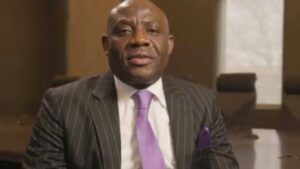How FG can attract Foreign Investors – CIS Boss
A thoroughbred multi-dimensional professional with over three-decade experience in the Nigerian Financial Market and President and Chairman of Council , Chartered Institute of Stockbrokers (CIS), Mr Oluwole Adeosun, FCS, in this interview, X-rays the state of the Nigerian Capital Market and offers suggestions on how the Federal Government can make the market competitive through constructive engagement with the regulators and operators.
Can you comment on the historic rally on NGX after the swearing -in of President Bola Tinubu ?
The Stock Market has been a barometer to measure developments in any economy, and the conclusion of the electoral process in Nigeria encapsulated in the inauguration of a new government is a major milestone that will excite any securities market. It is therefore not unusual for our market to spontaneously react to the positive development by way of the spike in the prices of the securities. The policy pronouncements, on the day of the inauguration, were also seen as a silver bullet that raised the consciousness of the stakeholders to the opportunities in the securities market.
In his inaugural Speech, President Bola Tinubu said there would be unified exchange rate. How will this impact the activities in the capital market?
That is one of the urgent policy corrections that the Nigerian Capital Market has been canvassing for in recent years. The wide gap between the official and parallel market rates is an anomaly which creates room for so many market malpractices. By creating a more efficient and transparent foreign exchange management system, the unified rate policy will make the market more competitive, make the currencies more easilyaccessible to manufacturers and other end users, and improve the bottom line for our quoted companies.
The transparency that will evolve from determining the rate will boost the integrity of the exercise which is expected to excite foreign investors to make a return to our securities market. There cannot be a perfect unified rate. But if the margin between the official rate and other windows is within 3 per cent range, it is normal. But the supply side of the forex has to be addressed as a basis to ensure that forex scarcity will not hamper the success of exchange rate unification in the medium and long run.
How can the Federal Government deploy the market to achieve the 6 % projected growth of the Nigerian Gross Domestic Product (GDP)?
That question will be thoroughly discussed and answered at the forthcoming CIS National Workshop coming up in Abuja on July 27, 2023. Suffice to state, for now, that the capital market is a very effective tool for actualizing a broad based Public Private Partnership strategy which we recommend for President Bola Tinubu and the various State Governors.
As at May 29, 2023 the Market Capitalization in the Nigerian stock market was just a little fraction of the country’s GDP, but that is a paradox, because the market has actually shown over time, that with adequate institutional support, it can significantly contribute to the economic transformation of the country. The capital market was used to transform the Nigerian banking system into the multi trillion industry that it is today, and to provide critical liquidity for governments in the country. The market is effective at pooling long term capital in the economy. Listing on the stock exchanges also enable large multinationals and MSMEs alike to raise massive capital with long term payback and very low cost. The commodity ecosystem is another revenue centre that the Federal Government can exploit. This is why the government should engage the operators in the ecosystem to know that is required for them to operate optimally.
Are there policy measures that the government should put in place to encourage both foreign and domestic investors to participate more in the capital markets ?
The role of government in businesses worldwide is to provide an enabling environment that will allow productive enterprises to flourish. By enabling environment, we mean rule of law, provision of adequate infrastructure etc. The government must create a savings friendly economic environment, and then, continuously work towards improving the Ease of Doing Business ranking of the country, to make it a competitive investment destination.
Tax policies should be reviewed, to encourageinvestments and not the other way round. For example, the recently introduced Capital Gains Tax will discourage high volume investments, and should be removed for now, particularly in view of the fragile nature of our economy and capital market. We need to encourage more investments.
The government should listen to us more; have more consultations with the Capital market in policy formulation. Steps should be taken to extend trading liquidity to the stock market, as is done in the advanced countries. Our pension funds should, as a matter of national interest, invest a higher proportion of their funds in the equity market to provide a stable foundation that motivates other high net worths to invest over the long term; and the Central Bank of Nigeria should pay more attention to the stock market, allow bank stocks to be included in margin lending portfolios being the most active and liquid stocks and encourage banks to partner more with Stockbroking firms. We cannot still be living in the past and be looking forward to a better future.
Is there a deliberate plan by the Institute to attract youths into the financial market ?
The youths represent our topmost priority area. Tertiary institutions and schools generally represent the first point of our annual capital market literacy drive. We also have the Inter-School Capital Market Quiz competition and recently, Essay Competition. We undertake Career Talk programs in so many institutions every year. As a matter of fact, we have gone to the extent of awarding the CIS Diploma scholarship to quite a number of young, indigent Nigerian citizens and many of them have responded positively.
When will the e-library of the Institute become operational ?
Very soon. We are currently putting the finishing touches to the library room, having procured the necessary tools for its operation. The unveiling will be announced before the early in the third quarter.
How would you advise investors under the current business environment ?
This is an excellent time to invest, with the guarantee of democracy in the country. The market will grow as the policies of the new government take shape. Having said that, please ensure that you always consult a qualified and licensed Stockbroker to guide your investment decisions. You may visit the CIS or SEC websites for the lists of qualified operators, or the websites of the various securities trading platforms. Investors should contact their stockbrokers for effective investment advice. Investment is a trade off of risk and return. An investor can make money in all seasons with appropriate investment advice.
There is still a knowledge gap in understanding the benefits of investment through the capital market. What are plans in the pipeline to deepen investor education?
We have a lot of plans. However, it must be understood that Capital Market Literacy drive is expensive. That is the reason we continue to request for grants: From government, market regulators, quoted companies and the general public. As you are aware, we launched CIS Academy last year and in just a small space of time, they have done so much in imparting skills to the larger financial industry; an example being the recent joint training Programme with Lagos Business School on Board Leadership in the Securities and Investments industry. We have so much to do, but the financial capacity is limited.




